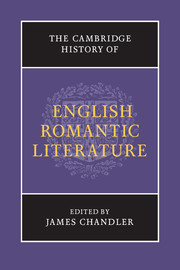Book contents
- Frontmatter
- Introduction
- Part I The Ends of Enlightenment
- Part II Geographies: The Scenes of Literary Life
- Part III Histories: Writing in the New Movements
- 15 Rebellion, revolution, reform: the transit of the intellectuals
- 16 Changes in the world of publishing
- 17 The new poetries
- 18 Romanticism and poetic autonomy
- 19 Transformations of the novel – I
- 20 Transformations of the novel – II
- 21 Theatre, performance and urban spectacle
- 22 The epigenesis of genre: new forms from old
- 23 The literature of the new sciences
- 24 The making of child readers
- Part IV The Ends of Romanticism
- Chronology
- Bibliographies
- Index
- 1 A New Pocket Map of the Cities of London and Westminster; with the Borough of Southwark, Comprehending the new Buildings and other Alterations, 3rd edn (London: William Faden, 1790).">
- References
19 - Transformations of the novel – I
from Part III - Histories: Writing in the New Movements
Published online by Cambridge University Press: 28 May 2009
- Frontmatter
- Introduction
- Part I The Ends of Enlightenment
- Part II Geographies: The Scenes of Literary Life
- Part III Histories: Writing in the New Movements
- 15 Rebellion, revolution, reform: the transit of the intellectuals
- 16 Changes in the world of publishing
- 17 The new poetries
- 18 Romanticism and poetic autonomy
- 19 Transformations of the novel – I
- 20 Transformations of the novel – II
- 21 Theatre, performance and urban spectacle
- 22 The epigenesis of genre: new forms from old
- 23 The literature of the new sciences
- 24 The making of child readers
- Part IV The Ends of Romanticism
- Chronology
- Bibliographies
- Index
- 1 A New Pocket Map of the Cities of London and Westminster; with the Borough of Southwark, Comprehending the new Buildings and other Alterations, 3rd edn (London: William Faden, 1790).">
- References
Summary
The novelist in the crowd
In the third volume of Mary Robinson’s Walsingham (1797), the eponymous hero – who by this point has been disinherited, jilted and jailed, and whose existence, he observes, has been ‘one perpetual scene of trial’ – visits the Library on the North Parade at Bath. Walsingham’s presence in this fashionable setting gives Robinson a pretext for putting fashion on trial and for assessing, in particular, how the smart set discuss novels. The results are discouraging. First, the visitors thronging the Library prove their sophistication by deriding the output of what they call ‘the modern novel-mill’. Then real-life popular novelist of the late eighteenth century Courtney Melmoth arrives for a cameo appearance, in time to enable Robinson to tout his ‘many excellent and beautiful productions’, but also in time to experience the insolence of his potential readership. In fact, modern novels are targeted for insult whenever Walsingham’s memoirs deal with fashionable society, and, at their worst, those insults implicate the genre’s very future. This is why, when, in this episode, a certain Lady Arabella wonders whether ‘there will be any books in another century’ and adds, giggling, that ‘[i]t would be monstrous comical if they should be totally exploded’, the hero is goaded into making a characteristically Romantic claim for the causal relation between imaginative literature and historical change: the claim that literature brings into being the posterity that reads it.
Keywords
- Type
- Chapter
- Information
- The Cambridge History of English Romantic Literature , pp. 451 - 472Publisher: Cambridge University PressPrint publication year: 2009
References
- 1
- Cited by

